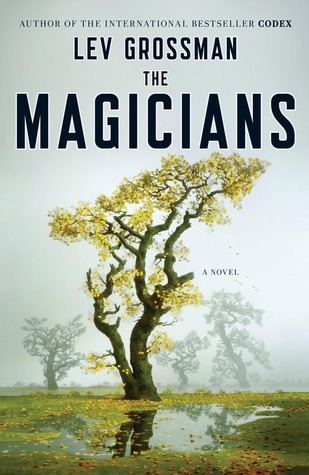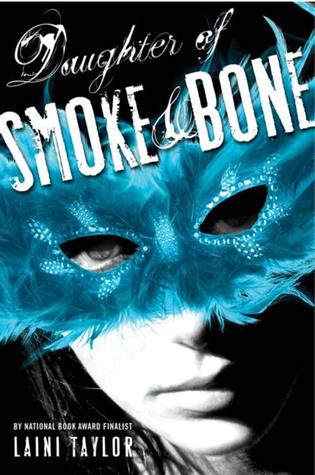Let's start out with a good one:
The Only 5-Star Rating
So I guess this would be my favorite book of the year (and yes I am super stingy with 5-star ratings, and even 4-star ones). Unfortunately, since I read it in February (which was a long time ago and before I started writing status updates while reading), I don't quite remember all the details. But I do remember that it made me cry (which isn't hard to do), and that it impressed me (which is), and that I loved the unconventional story structure. I am such a sucker for nonlinear story lines. I don't think I really fell in love with the protagonist and the love interest, but they didn't annoy me, which is actually saying a lot considering how picky I am. I do remember being moved by the relationships and the way we found out more and more about the group of kids from the past. Great read.
Made Me Laugh the Most
Dude, this book made me crack up SO much. I've been slowly and haphazardly making my way through the Discworld novels (I'm fortunate my library carries many of them), and while some of them turned out to be duds (at least to me), this one was a blast. I laughed so hard that my friend thought I was completely nuts, and that just made me laugh more. And it happened more than once! Ahh, Granny Weatherwax is so badass. I liked her a lot in the Tiffany Aching series, which I'd read before (love that series, particularly A Hat Full of Sky), but in this one she was just absolutely hilarious, and definitely made me eager to pick up all the rest of the witch books in the Discworld series. (Incidentally, the runner-up for this category is a Discworld book as well: Going Postal, featuring Moist Van Lipwig.)
Pissed Me Off the Most
This year I abandoned 30+ books while reading, but this particular DNF probably annoyed me the most out of all of them. I ranted about the green eye thing on my blog and the cultural appropriation stuff on Goodreads (with some great input and discussion from my friends — their posts are very much worth reading, more so than mine, haha). The disappointment hurt, a lot. I'd hoped so badly for this to be an amazing YA Asian fantasy because we definitely need more of those, but instead we got an author who doesn't think "exoticism" and "appropriation" are real things and that it should be ok for him to make stupid mistakes about someone else's culture and language just because he wanted his novel to have an aesthetic that's not overdone. Sigh.
Favorite Series
Favorite Historical Fiction
This book isn't for everyone, as there isn't much of a plot, and the voice of the main character didn't really fit her age. But I loved this book because I adored Calpurnia so, so much. I love science, and I love smart, strong-willed female characters, and this book had both. I very much enjoyed reading about Calpurnia's interactions with her family, her scientific outings with her grandfather, and the way she fought against the prescribed roles for women and girls. She is a feminist scientist in the making, which is AWESOME, and she completely won my heart.
Most Miserable
I don't even remember how this book made it to my to-read list, but I probably thought, "Huh, Harry Potter plus Narnia for grownups, sounds good," and made a note to look for it at the library. But I had no idea that it'd actually be about a miserable, selfish, hateful young man who makes a lot of stupid, self-absorbed decisions and mopes around being angsty all the time and then acts in such an jerkass way that terrible things happen to the one decent-ish character in the entire book. But it takes place first at a Harry-Potter-ripoff-magic-boarding-school and then in a Narnia-ripoff-fantasyland, so I guess that accounts for the description. It was so freaking depressing to read, and I hated pretty much everyone in the book (they mostly all hated themselves and each other, too). I was just like WHAT THE HECK IS THIS CRAP and was so disappointed and depressed and angry when I finished (plus relieved that it was over, I guess). Not to mention very, very miserable as well.
Favorite High Fantasy
I've had this on my to-read for a while, but it was Maya's recommendation that really spurred me to get it from the library. And I really enjoyed it! Vin was a great protagonist — smart, capable, brave, had to work for her skills, and wasn't whiny. I rooted for her throughout the book, and it was great to see her inner and outer transformations and growing relationships with her co-conspirators. All the plotting, cons, secrets, and mysteries were right up my alley. Plus, it had an interesting and unique magic system. Over all, I was pleasantly surprised by how much I enjoyed this book, and I look forward to reading more by this author. (Also, I ended up recommending this book to a friend and we read it at the same time, so I'm relieved it was good and that we both liked it!) (Longer review for Mistborn: The Final Empire here.)
Most Relieved I Liked
I bought the 5-book Lyra series bundle for Kindle because of a Cyber Monday sale, and also because I adore Patricia C. Wrede's Enchanted Forest Chronicles (particularly Searching for Dragons) and very much enjoyed her Mairelon series. The first four books were a little disappointing, though -- they weren't as good as her latter books, and the ratings for those ranged from 1.5 to 2.5. But I'd heard that The Raven Ring was the best, so I was hoping it'd be good. And I ended up liking it, even though it has a prophecy and a love triangle, both of which are usually things I don't like. But Wrede handled both those elements really well and while I didn't love those elements, they didn't frustrate me. Most of all, I loved Eleret — smart, sensible, capable, practical. Ah, definitely my kind of character. Seriously, I was so relieved after I finished this book and liked it, because I would've been so sad if I didn't like any of the Lyra books, given how much I enjoy Wrede's later work! (Longer review for The Raven Ring here.)
Everyone Loved But Me
It's kind of sad how many of the books I've read this year are contenders for this category. Ultimately I decided to go with Daughter of Smoke and Bone because of how popular it is and how little I liked it. I know a lot of people absolutely adored this one, but I just could not get over how the romance in this book turned the characters into people I hated. I found them to be shallow, stupid, and selfish, and I just couldn't bring myself to root for them. I know a lot of people like Taylor's writing, and I did like it in Lips Touch, but the descriptions of how enthralled these characters were by one another's beauty seriously put me off the prose in this one. I did find the worldbuilding interesting, but since characters and plot are what matter most to me when reading, in the end I did not enjoy this book the way most other readers did. I'm still very curious about how the series will end, though! I'm secretly hoping Karou and Akiva will actually not end up together, haha. (Longer review for Daughter of Smoke and Bone here.)
Favorite Fan Fiction
Side Character Who Stole My Heart
So for most of these other books, my comments tend to focus on the main character, because how I feel about the main character has a very good chance of determining what I feel about the entire book (although an amazing twisty plot or well-executed nonlinear story structure or laugh-out-loud humor can win me over as well). It's rare for me to latch on to a side character so strongly, so the last spot on this post goes to a character from the last book I read (and probably the last book I'll read this year): Raan, vessel of Maara of the Scorpion Clan. I love Raan so freaking much, you guys. She's spirited, clever, tricky, brash, and is fiercely determined to stand up for her own right to life when everyone else demands her death. I love that she rebels against the gods and tradition and the ritual of human sacrifice, and searches for a way to save her clan without the need for her own death. She drinks and swears and is always running away, struggles so much with her prescribed role of a vessel, somehow become friends with the other vessels despite their complete opposite views, and then, in the end, does what she thinks is best even though it costs her so much — and even then she never stops fighting. Just, love. (And best of all, she doesn't spend most of the book mooning over men when she has so much more at stake!) Anyway, Raan was the one who made Vessel a worthwhile read for me, and I so wish she had been the protagonist instead. Then this book would've been competition for Jellicoe Road! ;) (Longer review for Vessel here.)
So yeah, those are a few of the books I read in 2012 that made an impression on me, for better or for worse. I'm looking forward to reading more books in 2013 — and hopefully I'll be better at choosing books I like!
Feel free to steal one of the categories I've used above, or make up your own, and tell me about one of your 2012 reads that was memorable, whether in a good or not-so-good way!


















